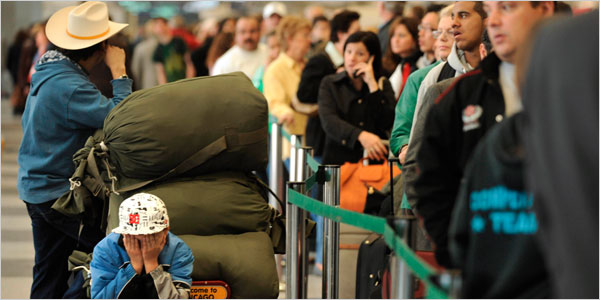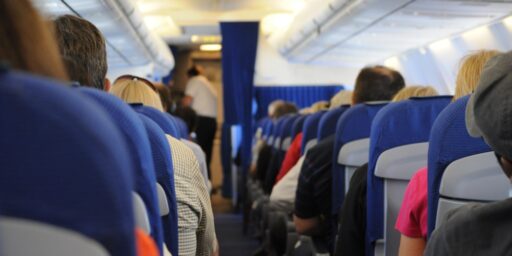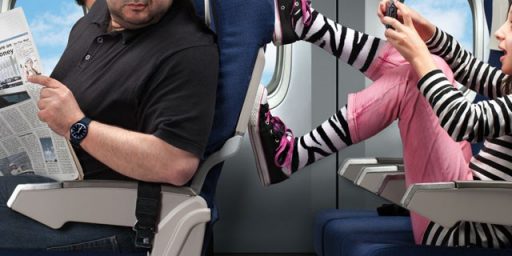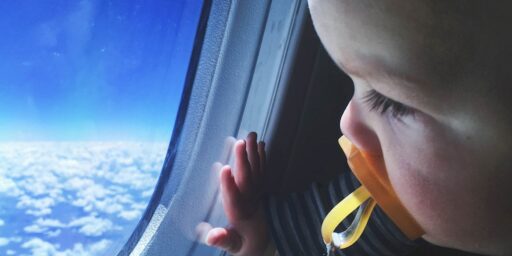Sick Man Too Fat to Fly on British Airways
A 500 pound French man was denied a return flight by British Airways.
A 500 pound French man was denied a return flight by British Airways.
AFP (“Too fat to fly: French family stranded in US“):
A French family who came to the United States for medical treatment said they were stranded in Chicago after British Airways determined their son was too fat to fly.
Kevin Chenais, 22, spent a year and a half at the Mayo Clinic for treatment of a hormone disorder which led him to weigh 500 pounds.
His mother was near tears as she described the family’s problems to the local CBS affiliate.
“We blame British Airways because now they just leave us, and they brought us here,” Christina Chenais told the station.
“If they could bring him here with that problem in economy, there was a way to take him back by economy but just get him back home for his medical treatments to continue.”
The family spent a week in an airport hotel trying to resolve the matter and, running out of money, has decided their only option is to take a train to New York and cross the Atlantic on the Queen Mary cruise ship.
Kevin Chenais requires round-the-clock oxygen and medical attention.
“I’m sure a lot of big people like me or bigger cannot travel because they have the same problem,” he told the station, head hanging down as he sat up in bed.
“This time before leaving I knew something would go wrong.”
A British Airways spokesperson told AFP that its customer service team “worked diligently to find a solution.”
“We will always try to accommodate someone if it’s possible and safe to do so,” Caroline Titmuss wrote in an e-mail.
“Unfortunately, it is not possible to safely accommodate the customer on any of our aircraft and the family has been offered a full refund.”
The airline said it provided hotel accommodation for the family along with “guidance and support” to help explore other travel options.
A spokeswoman for the French consulate told AFP it “attempted a mediation with British Airways, but the position of the airline is firm on the security issue.”
This is a sad situation, indeed. None of the reporting I’ve seen on this includes a rather key piece of information: how big was Chenais when he took the flight to the US? If he’s essentially the same size, it’s odd that the airline couldn’t accommodate a return flight on the same type of plane. If he’s gotten bigger, it’s perfectly understandable if awful.
To some extent, the airlines deserve the blame for this state of affairs. Passengers are getting bigger and the seats are getting smaller, so as to accommodate more passengers per flight. At 6’1″ and a little over 200 pounds, I find flying economy class quite unpleasant. Even in an aisle seat, I feel cramped and there’s never enough legroom. In the rare event that I’m seated next to an extremely obese person, I’m even less comfortable—and I can’t even fathom how they must feel. Recently, many airlines have started to invent new categories like “economy plus” to monetize this situation, charging passengers a premium for a few additional inches of legroom.
On the other hand, much of the blame for this situation goes to the consumer. Since deregulation hit, there’s been a race to the bottom in terms of service and comfort because most of the flying public (myself included) see airline travel as a commodity. Airlines that offer more legroom and better service than their competitors won’t gain enough in customer loyalty to make up for customers lost to higher fares.
Even if the market supported—or regulators mandated—larger seats and more generous spacing, we wouldn’t build airliners that would accommodate 500-pound men with medical equipment. People with extraordinary needs should reasonably expect to have to take extraordinary steps to meet them. Maybe that means buying two seats on the airplane—which I gather is what BA was suggesting in this case. Maybe that means taking alternative transportation.
It’s awful that Chenais is having to go through this additional expense and humiliation on top of his illness. (Although the $799 per person price of traveling on the Queen Mary 2 is much lower than I’d have expected.) But it’s unreasonable to expect the airlines to configure their business model around extraordinary cases.







Generally agree. There is much that is missing here. The news story is just designed to evoke sympathy, not study a long-term problem and solution.
So yeah, agreed there’s a lot left out here. Were the Queen Mary prices (total for the family, including train from Chicago to NY) really more than just buying one extra seat on the plane, or were two seats for the guy not viable?
The big question is – can he be evacuated in 90 sec? Airlines have to ensure they can evacuate any regular flight in 90 sec. If the guy can’t move by himself and can’t be carried because he’s too heavy, he can’t fly on a regular aircraft, even if he books multiple seats.
I hesitantly blame airlines for some of this, but really, how big (spacious) would you have to make general seating to accommodate passengers who are 300 to 500 pounds in weight, and the dimensions that come with that? I do not blame the airlines nor do I blame the super-sized passengers for this dilemma. Who foresaw the day when so many travelers would be obese – or in this case morbidly obese?
On 3 occasions in the past few years I have been seated next to people who were under 6 feet tall and probably weighed over 300 pounds, and they spilled over (encroached) into my seating space – in each case we were both uncomfortable, it was kind of sad.
James you’ve got an inch on me and about 20 pounds but
I too find that economy class is quite unpleasant. For a medical reason my doctor has actually advised that I avoid economy class for flights over two hours.
@al-Ameda: Right. I note later in the piece that 500-pounders are in a different category.
@Ron Beasley: It can indeed be dangerous to be confined like that, especially at high altitude. But flying First Class is absurdly expensive unless you’re using miles. And the issue changes dramatically if you have kids or otherwise need to fly multiple people.
According to what I’ve read at an aviation forum, he was too large to pass down an airline aisle and just barely able to fit through a cabin door with considerable assistance. Another somewhat surprising thing is that airline seats are not strong enough to safely accommodate anyone in excess of about 350 to 375 pounds. It’s not a matter of width; in the event of a crash or even a hard landing a seat holding a heavier person might break free of its mountings and present a major safety hazard to other passengers.
Realistically, given his size, immobility and oxygen dependency, the only feasible way for this man to fly is on a specially equipped air ambulance.
@James Joyner: Indeed, which is why I can’t go to far from home.
@James Joyner: I think if we had some no kids flights there’d be a great demand….
(No, I don’t want your squalling toddler to kick the back of my chair for 2.5 hours, pull my hair, poke fingers into my ears, or whatever. If your child isn’t able to control her behavior for that period of time, then don’t travel by plane.)
@grumpy realist:
Yes (you’d get 27 likes from me for that one if I could do it).
A few years ago on a return flight from Chicago to San Francisco, 2 young boys in front of me (aged 7 or 8 or so?) were rocking their their seats back and forth and they nearly caused my ginger ale and peanuts to spill. I leaned forward and asked the boy to please stop because he nearly caused my drink to spill. The mother got up, leaned over the seat and said to me, “don’t you EVER speak to my child again.” To which I said, “fine, then YOU tell your child to stop rocking his seat, or YOU will have to clean up the mess.” She wrapped it up by telling me to, “f*** off.” All I can say is, thank god for my iPod because that would have been a lousy 4 hour flight home without it.
@grumpy realist: @al-Ameda: For the most part, these are parenting issues, not toddler issues.
Kids are going to be talkative and infants may well cry during take-off and landing owing to pressurization issues. There are things that parents can do to mitigate those things, but they only go so far. Some level of tolerance for that is just the price of living in society. It is, after all, public transportation, not a private charter.
But there’s no excuse for letting the kids kick the seats, pull hair, and the like.
@James Joyner:
I’ve traveled with my kids, and I have a lot of sympathy for parents with infants or toddlers – there’s only so much parents can do. Parents with adolescent kids are another matter – mom and dad have an obligation to other travelers to at least try to control the behavior of their kids.
One thing I did get out that Chicago trip was a good anecdote to tell to friends (and OTB.) I still laugh when I think about it, the only way it could have been better is if I had “inadvertently” spilled my ginger ale on her (but I’m too classy for that.)
We must remember that the weight of the passengers and baggage is important to the safety of the flight. It could have been that the pilots and flight engineers thought that this man could throw the airplane’s balance off. It might have been a different type of airplane on the return trip or they could have been facing headwinds or turbulence that would make the flight rougher.
@Tyrell: I thought along the same lines, but then dismissed it. This guy is about the weight of three average people. Airliners routinely fly with a lot of empty seats, meaning that the passengers are occasionally scattered randomly throughout the cabin (with a bias towards the front, generally). If a plane can handle several empty rows of seats, then it can handle him wherever he sits.
A quick check of Wikipedia gives some numbers: a Boeing 747-400ER has an operating empty weight of about 196 tons, and a maximum takeoff weight of 437 tons. This guy’s a quarter of a ton.
Another set of numbers: a gallon of jet fuel weighs 6.79 pounds, so 500 pounds of jet fuel is about 74 gallons of fuel. The plane can hold over 63,000 gallons of fuel. (Thank you, Wikipedia and Google.)
More significant concerns are those @Peter: brought up.
@Peter: How about some sort of military plane? Would that be allowable?
Related – lack of response on the trans fat “ban” is surprising. Why isn’t the right wing going all “you can squeegee the fat from my cold dead fingers?”
@john personna: Just another example of how C. S. Lewis was a prophet:
It’s sad, really, how the American people so desperately need to be protected from themselves. How they are so unable to make basic decisions for themselves. Thank heavens we have the enlightened class to intervene and make so many of our decisions for us.
@john personna: Trans fats have been phased out for a while. I guess since it was done gradually no one noticed. I remember when trans fats were brought in to replace those “harmful” animal fats. Of course, they used to say eggs were bad. I am now happy that chocolate is on the healthiest foods lists!
“If you move a chair one foot a month, no one notices and after a while, it is on the other side of the church” pastor commenting on how to make changes in a church.
It was industry, not government, which made trans fats pervasive.
Literally industrial food.
Interesting side issue: Did the French gov’t supported health-care system pay for 18 months of treatment at the Mayo Clinic? Does anyone besides myself find that amazing?